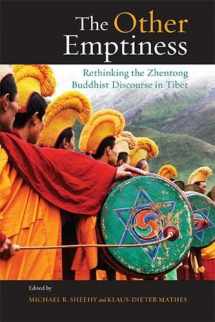
The Other Emptiness: Rethinking the Zhentong Buddhist Discourse in Tibet
ISBN-13:
9781438477572
ISBN-10:
1438477570
Author:
Publication date:
2019
Publisher:
SUNY Press
Format:
Hardcover
400 pages
Category:
China
,
Asian History
FREE US shipping
Book details
ISBN-13:
9781438477572
ISBN-10:
1438477570
Author:
Publication date:
2019
Publisher:
SUNY Press
Format:
Hardcover
400 pages
Category:
China
,
Asian History
Summary
The Other Emptiness: Rethinking the Zhentong Buddhist Discourse in Tibet (ISBN-13: 9781438477572 and ISBN-10: 1438477570), written by authors
, was published by SUNY Press in 2019.
With an overall rating of 4.0 stars, it's a notable title among other
China
(Asian History) books. You can easily purchase or rent The Other Emptiness: Rethinking the Zhentong Buddhist Discourse in Tibet (Hardcover) from BooksRun,
along with many other new and used
China
books
and textbooks.
And, if you're looking to sell your copy, our current buyback offer is $0.6.
Description
Presents a new vision of the Buddhist history and philosophy of emptiness in Tibet.
This book brings together perspectives of leading international Tibetan studies scholars on the subject of zhentong or “other-emptiness.” Defined as the emptiness of everything other than the continuous luminous awareness that is one’s own enlightened nature, this distinctive philosophical and contemplative presentation of emptiness is quite different from rangtong―emptiness that lacks independent existence, which has had a strong influence on the dissemination of Buddhist philosophy in the West. Important topics are addressed, including the history, literature, and philosophy of emptiness that have contributed to zhentong thinking in Tibet from the thirteenth century until today. The contributors examine a wide range of views on zhentong from each of the major orders of Tibetan Buddhism, highlighting the key Tibetan thinkers in the zhentong philosophical tradition. Also discussed are the early formulations of buddhanature, interpretations of cosmic time, polemical debates about emptiness in Tibet, the zhentong view of contemplation, and creative innovations of thought in Tibetan Buddhism. Highly accessible and informative, this book can be used as a scholarly resource as well as a textbook for teaching graduate and undergraduate courses on Buddhist philosophy.
This book brings together perspectives of leading international Tibetan studies scholars on the subject of zhentong or “other-emptiness.” Defined as the emptiness of everything other than the continuous luminous awareness that is one’s own enlightened nature, this distinctive philosophical and contemplative presentation of emptiness is quite different from rangtong―emptiness that lacks independent existence, which has had a strong influence on the dissemination of Buddhist philosophy in the West. Important topics are addressed, including the history, literature, and philosophy of emptiness that have contributed to zhentong thinking in Tibet from the thirteenth century until today. The contributors examine a wide range of views on zhentong from each of the major orders of Tibetan Buddhism, highlighting the key Tibetan thinkers in the zhentong philosophical tradition. Also discussed are the early formulations of buddhanature, interpretations of cosmic time, polemical debates about emptiness in Tibet, the zhentong view of contemplation, and creative innovations of thought in Tibetan Buddhism. Highly accessible and informative, this book can be used as a scholarly resource as well as a textbook for teaching graduate and undergraduate courses on Buddhist philosophy.


We would LOVE it if you could help us and other readers by reviewing the book
Book review

Congratulations! We have received your book review.
{user}
{createdAt}
by {truncated_author}


